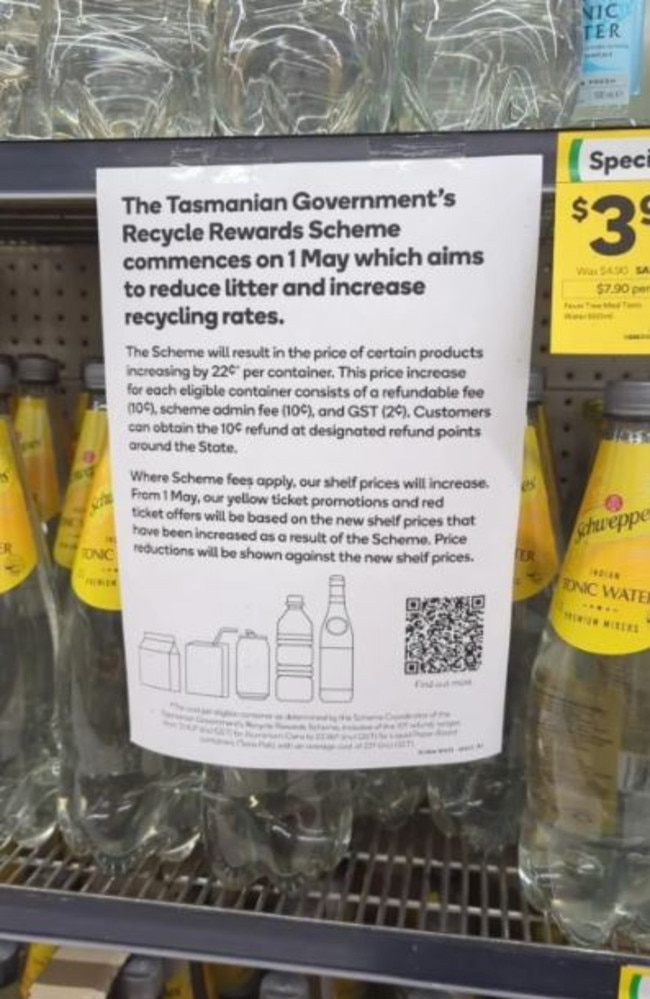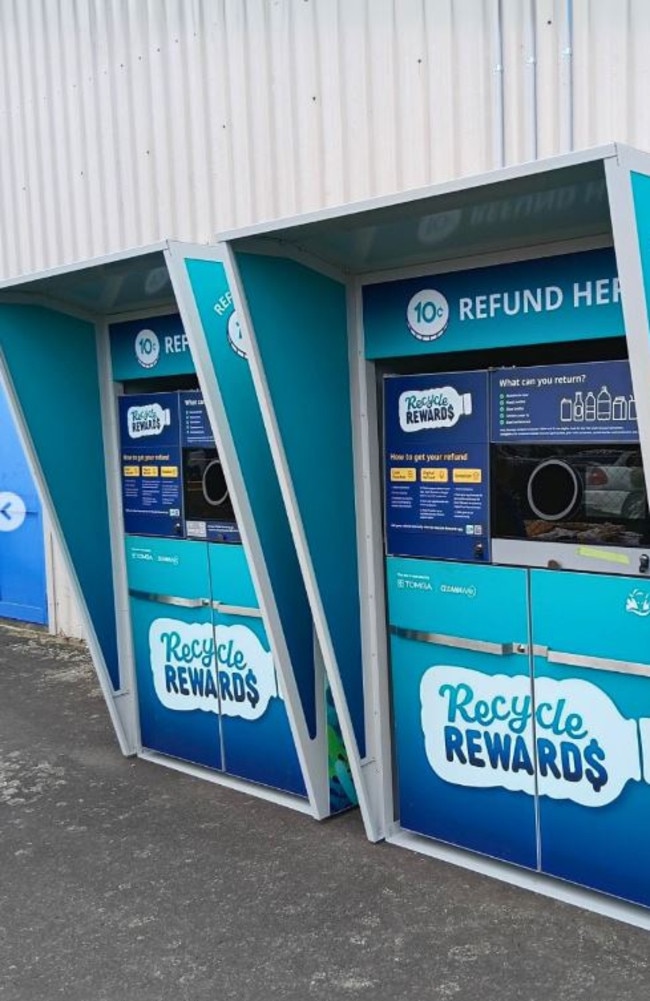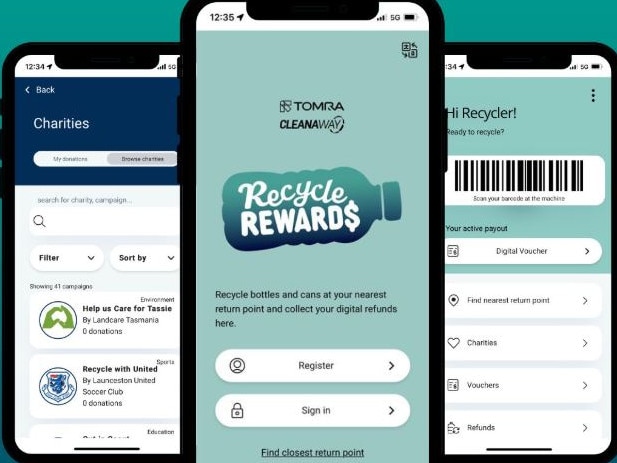Sign that drinks are set to cost more in Tasmania
A sign spotted in a supermarket is the first sign that beverage prices are about to rise in one Australian state.
Real Life
Don't miss out on the headlines from Real Life. Followed categories will be added to My News.
A sign spotted in a supermarket is the first sign that beverage prices are about to rise in one Australian state.
Woolworths stores in Tasmania alerted customers that from May 1, beverage prices in the supermarket will be 22 cents dearer. This is because the state will join the rest of the country and introduce its Recycle Rewards scheme.
This is where eligible products can be taken to a recycling station, and Tasmanians can get 10 cents back for each item.
“The scheme will result in the price of certain products increasing by 22 cents per container,” the sign explained.
“This price increase for each eligible container consists of a refundable fee (10 cents), scheme admin fee (10 cents) and GST (2 cents).”

The Recycle Rewards scheme is run by TasRecycle, a non-profit established by Coca-Cola, Lion and Asahi. In order to run the scheme, it has passed operating costs onto businesses. For instance, it will charge 21.43 cents per aluminium can sold in the state and 22.19 cents for every glass bottle.
There is a container-free threshold, where the Department of Natural Resources and Environment Tasmania has ruled that businesses won’t have to pay scheme costs for their first 20,000 containers each year.
“We’ve been working through the implementation of the Tasmanian Government’s Container Deposit Scheme with our supply partners,” a Woolworths spokesperson told news.com.au.
“As in all other states of Australia, where there are retail price changes resulting from the costs associated with a container deposit scheme, we have communicated these changes to customers in-store.
“We’re supportive of the Container Deposit Scheme based on successful implementation in other states and the positive environmental, litter reduction and recycling outcomes.
“The Container Deposit Scheme in Tasmania will commence on May 1.”
However, Woolworths won’t be the only ones raising their prices as a result of the recycling scheme being implemented, with the TasRecycle website stating: “The costs of Recycle Rewards are paid by beverage suppliers. Suppliers decide what proportion of costs are passed on to consumers. Independent reviews in other states have found no evidence of drink price increases exceeding scheme costs during the first year of implementation of container refund schemes.”

Andrew Quarry from Australian Liquor Marketers in Tasmania told the ABC that businesses will have “no choice” but to pass this cost on to consumers.
“That cost increase is so significant that at no point could we expect anyone to absorb that cost,” Mr Quarry said.
Fleur Brown, the chief industry affairs officer at the Australian Retailers Association agreed, telling news.com.au: “The structure of the scheme leaves businesses with little choice but to pass the cost on. While this is not ideal, businesses have high running costs to operate and many have narrow margins.”
“This adds strain to household budgets and may influence purchasing decisions, with retailers likely to face consumer backlash for price increases despite the costs being driven by government policy.”
She said while businesses are keen to support the initative, it does place new pressures on businesses.
Ms Brown also said that there are gaps in these programs, such as limited coverage of materials, inconsistency across states, lack of local recycling capacity, contamination and public awareness.
A Department of Natural Resources and Environment Tasmania spokesperson told news.com.au that Recycle Rewards was designed by the state government to provide benefits, as well and increase recycling, decrease litter, create jobs and economic opportunities.
“Recycle Rewards is a product stewardship scheme, so the costs of the scheme are paid by beverage suppliers. Suppliers decide what proportion of costs are passed on to consumers. Independent reviews in other states have found no evidence of drink price increases exceeding scheme costs during the first year of implementation of container refund schemes,” the spokesperson said.

The NRE Tas spokesperson said the government has been working with small beverage companies to reduce the impact of the scheme but ensure these businesses get to be part of it.
“Under ‘producer responsibility’ the beverage industry pays for the scheme, including refunds,” the spokesperson said.
“Because the Tasmanian Government recognises the importance of small businesses in the beverage industry, for the first time nationally a Cost-Free Threshold has been introduced. As a result, this means effectively that most beverage companies will not pay scheme costs in relation to their first 20,000 eligible drink containers supplied each year.
“This cost-free threshold aims to help small businesses continue to thrive as those who annually supply less than 20,000 drink containers will not pay a contribution. Grants have also been established to help Tasmanian small beverage producers fund transition costs associated with the commencement of Recycle Rewards (e.g. updating labels, barcodes).”
The cost of the scheme includes refunds for customers, plus the operating costs. Operating costs include administration, financial management and promotion of the scheme.
“There are fixed costs associated with setting up and operating schemes like Recycle Rewards all over Australia. These are necessary to ensure that our scheme is accessible, convenient, financially sound, protected from potential fraud and delivering the unique value the scheme will bring for all Tasmanians,” the spokesperson said.
Originally published as Sign that drinks are set to cost more in Tasmania





